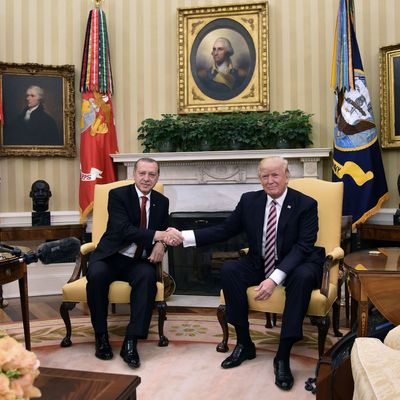
On Friday, President Trump announced that he will double America’s metal tariffs on Turkey — despite the fact that he has no good reason for doing so.
He does have an understandable reason: Turkey has been holding an American pastor captive for 21 months, on grounds that the preacher was involved in the failed coup attempt against Turkish president Recep Tayyip Erdogan in 2016. The White House thought that Turkey had agreed to release the pastor in exchange for Israel’s release of a Turkish woman that had allegedly given funding to Hamas. But Israel released that woman last month, and pastor Andrew Brunson of North Carolina remains in a Turkish prison.
Putting a 50 percent tariff on a foreign country’s steel exports isn’t the most conventional way to secure an imprisoned American’s relief. But given that Turkey is in the midst of an economic crisis, it might prove an effective one.
Unfortunately, this still isn’t a good reason for Trump’s latest trade action — because it is an illegal one. The president launched his steel and aluminum tariffs on the grounds that maintaining a robust domestic metal industry was a core national-security interest of the United States, and that competition with metal imports was threatening to drive said industry into extinction.
This premise is absurd. But invoking national security is the only way to square Trump’s policy with U.S. law and WTO rules.
So, to hike tariffs on Turkey, Trump needed a reason why maintaining America’s domestic metal industry required imposing even steeper tariffs on Turkish exports than were already in place. Here’s the one he went with:
This is a very bad rationale for hiking tariffs on a country’s exports. In the past, Trump has threatened to impose trade barriers on countries that deliberately push down the value of their currencies, so as to make their goods cheaper for American consumers (and thus, more competitive than the wares of U.S. manufacturers).
But Turkey is not manipulating its currency; the lira is falling because the country is suffering from an economic crisis. Thus, Trump’s tweet suggests that any country that enters a time of economic turmoil — and consequently, sees the value of its currency fall — is a fair target for punitive trade actions by the United States.
Cornell University economist Eswar Prasad told the New York Times Friday that Trump’s announcement sets “a worrying precedent for future trade sanctions that could be triggered by purely market-driven changes in exchange rates … It could serve as a template for further tariff actions against China if the renminbi depreciates further relative to the dollar, even if that depreciation were mainly a reflection of the relative strength of the U.S. and Chinese economies.”
Trump’s tweet sent the already-depreciating Turkish lira into free fall, and appeared to bring other developing market currencies — and the euro — down with it. In the latter’s case, investors fear that Europe’s banks could sustain large losses if Turkey is forced to default on its debts.
It is possible that Trump cited the lira’s decline as a mere pretense for pressuring Turkey to release the American pastor. But he can’t say that without exposing his tariffs to an airtight legal challenge. And what he did say Friday morning could weigh on global markets for some time to come.






























